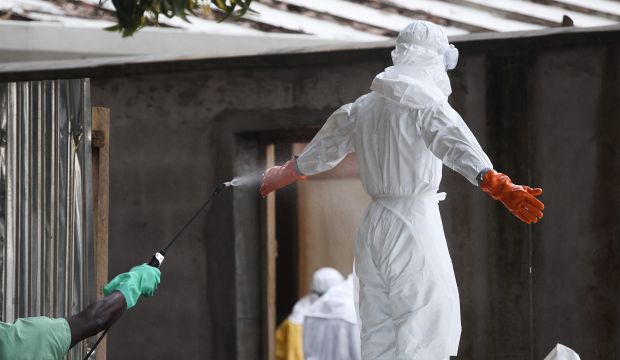
A Liberian nurse in protective clothing is sprayed with disinfectant after preparing several bodies of victims of Ebola for burial in the isolation unit of the ELWA Hospital in Monrovia, Liberia, on August 1, 2014. (EPA/Ahmed Jallanzo)
Freetown/Monrovia, Reuters—Hundreds of troops deployed in Sierra Leone and Liberia on Monday under an emergency plan to fight the worst outbreak of the deadly Ebola virus, which has killed more than 826 people across West Africa.
Panic among local communities, which have attacked health workers and threatened to burn down isolation wards, prompted regional governments to impose tough measures last week, including the closure of schools and quarantine of the remote forest region hardest hit by the disease.
The hemorrhagic virus, which has no known cure, has infected more than 1,400 people in its first outbreak in West Africa, straining the capacity of under-funded health systems and aid groups to breaking point in one of the world’s poorest regions.
Despite pleas for help from aid groups, the number of cases is also creeping steadily higher in Guinea, where the outbreak originated in February. And Nigeria’s megacity of Lagos on Monday recorded its second case of Ebola in a doctor who treated US victim Patrick Sawyer.
Long convoys of military trucks ferried troops and medical workers on Monday to Sierra Leone’s far east, where the density of cases is highest. Military spokesman Col. Michael Samoura said the operation, codenamed Octopus, involved around 750 military personnel.
Troops will gather in the southeastern town of Bo before travelling to isolated communities to implement quarantines, he added. Healthcare workers will be allowed to come and go freely, and the communities will be kept supplied with food.
In neighboring Liberia, President Ellen Johnson-Sirleaf and ministers held a crisis meeting on Sunday on putting in place a series of anti-Ebola measures as police contained infected communities in the northern Lofa county.
Police said they were setting up checkpoints and roadblocks for key entrance and exit points to those infected communities and that every resident would be stopped. Nobody would be allowed to exit quarantined communities. Troops were fanning out across Liberia to help to deal with the emergency.
“The situation will probably get worse before it gets better,” Liberian Information Minister Lewis Brown told Reuters. “We are over-stretched. We need support; we need resources; we need workers.”
The World Health Organization (WHO) plans to launch a 100-million-US-dollar response plan and is holding urgent talks with donors and agencies to increase resources to the region. WHO chief Margaret Chan warned regional leaders on Friday that Ebola was outpacing their efforts to contain it and warned of “catastrophic” consequences if the situation deteriorated.
Medical charity Médecins Sans Frontières, which normally spearheads the fight against Ebola, has only a small team in Liberia and says it does not have the capacity to increase it.
Health workers say they are overwhelmed by the number of cases, a scenario exacerbated by the departure of some international staff following the infection of two US staff of the Samaritan’s Purse charity in Liberia.
One of them, Kent Brantly, was improving on Sunday after being flown back to the United States for treatment. The second staff member, Nancy Writebol, was expected to arrive back in the United States by midday on Tuesday, according to Samaritan’s Purse.
The normally bustling streets of Sierra Leone’s capital Freetown were eerily quiet on Monday after President Ernest Bai Koromo called on residents to stay home and pray, a Reuters reporter said.
Ambulances and police vehicles lined the streets while radio stations played interviews with Health Ministry officials and a musical jingle informing the local population of symptoms.
Highly contagious, the deadliest strain of the Ebola virus can kill up to 90 percent of those infected, though in the current outbreak the rate is running around 55 percent. Symptoms initially include muscle pains and joint aches, though they worsen to vomiting, diarrhea and internal and external bleeding in the final stages.
Officials seeking to bury Ebola victims faced protests at a burial site in a suburb of Monrovia this weekend and about 25 soldiers were called in to guard the site.
Director of Liberian National Police Chris Massaquoi said last week that troops would place forces in areas where crowds had previously stoned health workers. He added that all protests, demonstrations and marches had been forbidden.
